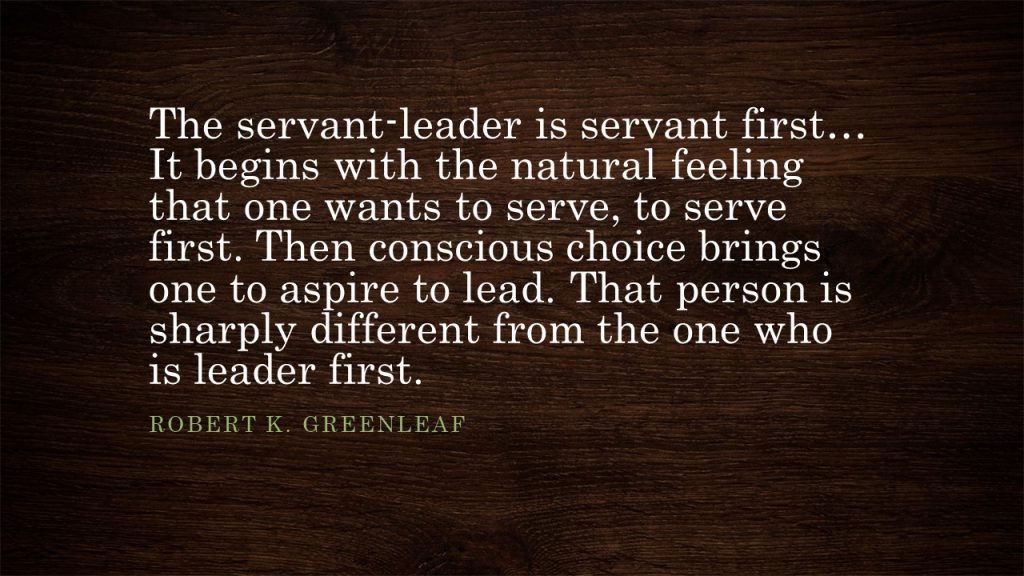
Servant leaders can be seen at all levels of an organization. Here’s an example of servant leadership from the highest level.
This event is seared into my memory for life! It was after lunch at an all-day leadership meeting. We were chatting away at our table, oblivious to the dishes and leftovers. The CEO walked over, asked if I was done, then cleared my plate and cutlery away. I was fairly new to the organization, so I searched the faces of my colleagues at the table, wondering, “Is this normal? Has this happened before?” The look of shock on the face of a director who reported directly to the CEO said it all. Her jaw dropped, she held up her hands in disbelief and shook her head slowly. Obliviously, this had never happened before. And it was a powerful, unforgettable demonstration of servant leadership in action. Now, if the CEO could do this, then every other leader of the organization could emulate it.
PMs need more than just technical skills
Weeks ago, a reader asked what attributes a project manager needs other than specific technical PM skills? Servant leadership topped my list. How does a project manager demonstrate it? There are many simple ways. On one project, there was an item on the critical path, and it all depended on one busy, yet unnoticed, low-key person performing a labourious task on a specific day. I was going to be away at a conference. So I arranged for someone else to get her favourite drink for her on that particular day. That gave her the added boost she needed to get the task done.
Why servant leadership works for project managers
As a project manager, your success depends on the contribution of many indirect reports. These project team members have other daily duties competing for their time. Their perception and experience of you will impact how engaged they are and whether they will go the extra mile for you and the project. Recently I heard one person reminisce that project managers used to be kind but many of them have since retired; in the next breath, they complained that new project managers are selfish. Now that is one person’s experience in one company and I would like to believe that it is not generally true. I hope you will do your part to help create the reality of project managers as servant leaders. You will be surprised at how tiny acts of service can help lift the morale of your project team and influence the culture of your organization.
How to Practise Servant Leadership as a Project Manager

It was my first few days on the job. I was checking for letter mail in the mailroom. (Yes, this was decades ago.) I froze and tried not to be noticed when the president walked in. In my previous company, you never approached or talked to the CEO. Well, I was about to find out how different my new organization was. “Hi Wan, how are you today?” greeted the president whom I have never met in person, let alone speak with. As a fresh hire in IT, not a manager or supervisor, I was so surprised that he knew me and my name. I must have mumbled a reply. We had a short friendly conversation. I don’t recall anything specific but I definitely remember the impact that encounter had on me decades later.
That simple greeting was, for me, an example of servant leadership in action. This busy president cared to learn the names of new hires so that he could greet them by name at the very first encounter. As a project manager, you can do the same. In this era of remote work-from-home teams, you can learn the names of everyone on your project team and sub-teams, and schedule a brief get-to-know you online meeting.
Learn the names of every new hire
Take it a step further and learn the names of every new hire who could potentially be on your project. Reach out to them on their first few days at work. Tell them that they can approach you with questions as they settle into the company. As a project manager, you have a broad horizontal view across the organization. New employees tend to work within their departmental silos. They are generally keen to learn about other departments and key projects. By reaching out and helping new hires early in their jobs, you build relational capital. You have a better chance of getting their support when your project rolls out changes.
Years later, when the president left his post, he again reached out over the phone to say thank you. Again, that’s something that I remember to this day. Not what he said, but that he bothered to call. As a project manager or a PMO, you too can exercise servant leadership by saying a personal thank you to everyone who contributed to making a project successful. Include this in your project plan from day one. Whether it’s a hand-written card with personal notes from project leaders or a video recorded thank you, appreciation goes a long way towards getting the commitment of the same people, already busy with operational work, when you call on them again to put in that little extra effort to achieve your next project goal.
Related posts
Sources
